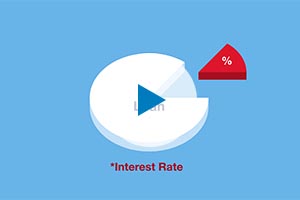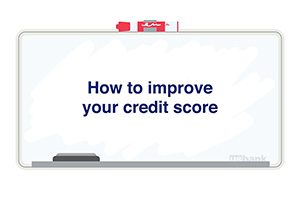If you’ve ever applied for a store credit card at the register on a whim, you’re not alone — so have nearly 68% of U.S. adults. But should opening a line of credit really be a decision that’s made spontaneously?
Most major retailers now offer a line of credit to their customers, usually accompanied by extra incentives. According to a new survey by CreditCards.com, nearly seven out of 10 people applied for retail credit cards on an impulse at checkout. And while store credit cards have gotten a bad rap in the past for their high interest rates, opening additional lines of credit could be good for your financial wellness — when done thoughtfully.
What is a store credit card?
Retail credit cards come in two forms, the first being a closed-loop credit card. A closed-loop card can only be used within the retailer’s chain of stores. The second form is a co-branded card which allows you to use it anywhere that accepts cards within that network (for example, Visa® or Discover®).
Unlike bank credit cards, store credit cards do not usually come with an annual fee. They can, however, come with deferred interest. While pushing out interest payments might be tempting up front, once the grace-period has expired, it could be a large financial blow to pay interest on all your purchases at once.
Pros and cons of store credit cards
Ted Rossman, senior industry analyst for CreditCards.com, said store credit cards carry negative connotations because of high interest rates and lesser rewards programs. But with more retailers starting to offer competitive rewards and widening the scope of where you can use their cards, the pros could outweigh the cons.
Pros of a store credit card
- Rewards: Retailers generally offer rewards along with their credit cards to incentivize purchasing. From 5% off all transactions to annual bonuses, a store credit card can help you spend less, so long as you’re loyal to that retailer.
- Low credit score: Different from traditional credit cards, store credit cards don’t require the same high credit score. This could be a good strategy for those looking to improve a low credit score.
Cons of a store credit card
- High APRs: Store credit cards have notoriously high APRs (annual percentage rate). Your average credit card has an APR of 19.92%, and in comparison, the average retail card has an APR of 24.35%
- Low credit limit: Because you don’t need a high credit score to open one of these cards, retailers set a low cap on how much you can charge. If you are planning on getting a store credit card, review the limit to make sure it covers a typical month’s worth of spending at that retailer.
- Credit review: Part of opening any line of credit is having your credit report reviewed. While you can get pre-approved at the register after a soft pull of your records, it’s the hard pull that comes later that will bring your credit score down.
Is the pressure worth the promotions?
One big reason people sign up for store credit cards is because they feel pressured to. This is especially true of younger generations like Millennials and Gen Zers. While the employee at the counter is simply doing their job, you should never feel obligated to make this kind of decision spontaneously. Any time you open a line of credit you should consider the impact it will have on your financial future.
Before you open a store credit card, consider how that card will fit into your life: Are you going to be able to make regular payments to this card? Are there more rewards than just a sign-up benefit? Can your credit score handle a hard review? Are you going to be able to pay the deferred interest?
There are too many factors with a store credit card to risk opening one on impulse. The next time you’re asked at the register if you’d like to save 15% by signing up for a credit card, take the information brochure home and do your research in a low-pressure environment. In the end, whether you open a store credit card or not is all dependent on your personal needs and preferences.
Continue reading to learn more about what helps and what hurts your credit score. Here are some truths and some common myths revealed.




































